Genealogy
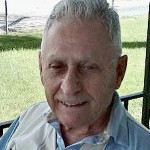
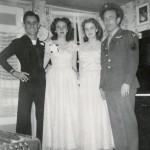 My uncle, George Hushman, became the first in-law in my mom’s family, when he married her sister, Evelyn Byer. He was a novelty, I suppose. I know that is how the younger siblings always feel when it comes to brothers-in-law or sisters-in-law. It all new and fun, and the younger siblings are always made to feel special. Funny thing about little kids, each new family member is as awesome as the last, but somehow that first one always holds a special place in their hearts. It’s like suddenly their horizons are broader. They learn about the fact that there are people outside their little world, who somehow fit into their little world. Then too, as the new children come along and subsequent in-laws are added, the love in the family just seems to grow everyday.
My uncle, George Hushman, became the first in-law in my mom’s family, when he married her sister, Evelyn Byer. He was a novelty, I suppose. I know that is how the younger siblings always feel when it comes to brothers-in-law or sisters-in-law. It all new and fun, and the younger siblings are always made to feel special. Funny thing about little kids, each new family member is as awesome as the last, but somehow that first one always holds a special place in their hearts. It’s like suddenly their horizons are broader. They learn about the fact that there are people outside their little world, who somehow fit into their little world. Then too, as the new children come along and subsequent in-laws are added, the love in the family just seems to grow everyday.
That is how my sisters and I have always felt about Uncle George. I guess it was because we were close in age to their kids, and Mom and Dad were friends with Aunt Evelyn and Uncle George, as well as siblings. Our families did things together, and the two couples did things together, such as bowling. It was their weekly outing, and they always had such a good time. I suppose that is how bowing became a family tradition. It seems that if you enjoy a sport, you pass it down to your kids. Many of both families have bowled at one time or another, and some continue to do so, such as my husband, Bob Schulenberg and me.
Many a New Year’s Eve party included Aunt Evelyn, Uncle George, and their kids, and we always had a great time. My parents liked having a party, because the 1st of January is my mother’s birthday. It seemed a perfect 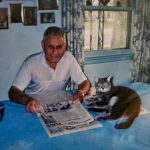
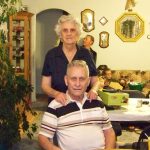 reason to have a big bash. And my sisters and I always felt like it was a better party when the families got together for it…especially if they brought the kids. I’m not sure how some people might have felt about that part, but Mom and Dad always wanted to include the kids, and I think their families appreciated that. I mean, how many New Year’s Eve parties include the kids? Very few. I know that as kids, whenever Aunt Evelyn, Uncle George and their kids were over…it was a good time. Today is Uncle George’s 90th birthday. Happy birthday Uncle George!! Have a great day!! We love you!!
reason to have a big bash. And my sisters and I always felt like it was a better party when the families got together for it…especially if they brought the kids. I’m not sure how some people might have felt about that part, but Mom and Dad always wanted to include the kids, and I think their families appreciated that. I mean, how many New Year’s Eve parties include the kids? Very few. I know that as kids, whenever Aunt Evelyn, Uncle George and their kids were over…it was a good time. Today is Uncle George’s 90th birthday. Happy birthday Uncle George!! Have a great day!! We love you!!
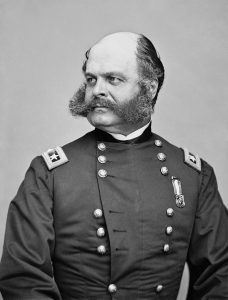 Those who have studied the Civil War, or know much about the United States at all, know that the Civil War was won by the Union, but that does not mean that there weren’t battles that they lost. There are very few wars that are lopsided in their battle field victories. One such battle was the Battle of Fredericksburg. On December 11, 1862, Ambrose Burnside, newly placed in command of the Army of the Potomac, planned to cross the Rappahannock River in Virginia with over 120,000 troops. When he finally crossed it, two days later, on December 13, 1862, he confronted 80,000 troops of Robert E Lee’s Confederate Army at Fredericksburg. With 200,000 combatants, this was the largest concentration of troops of any Civil War Battle. It was also one of the battles the Union Army would lose. In a crushing defeat, the Union Army suffered nearly 13,000 casualties, while the Confederate Army only lost 5,000.
Those who have studied the Civil War, or know much about the United States at all, know that the Civil War was won by the Union, but that does not mean that there weren’t battles that they lost. There are very few wars that are lopsided in their battle field victories. One such battle was the Battle of Fredericksburg. On December 11, 1862, Ambrose Burnside, newly placed in command of the Army of the Potomac, planned to cross the Rappahannock River in Virginia with over 120,000 troops. When he finally crossed it, two days later, on December 13, 1862, he confronted 80,000 troops of Robert E Lee’s Confederate Army at Fredericksburg. With 200,000 combatants, this was the largest concentration of troops of any Civil War Battle. It was also one of the battles the Union Army would lose. In a crushing defeat, the Union Army suffered nearly 13,000 casualties, while the Confederate Army only lost 5,000.
People might think that Burnside was not much of a commander, but it should be mentioned that this was the first time he had commanded an army. He was a graduate of West Point, had risen quickly up the ranks, and had seen action in several battles prior to this fateful day. Abraham Lincoln had approached him about taking control of the Union’s Army. He hesitated, partly out of loyalty to the current commander and former classmate, and partly because he was unsure of his own ability. In the end the prior commander’s failure assured that he was on the way out, and rather than have Major General Joseph Hooker, a fierce rival, pass him up, Burnside accepted the commission on November 7, 1862.
Knowing that he had to have the element of surprise, Burnside came up with a plan to confront Lee’s Army of Northern Virginia at Fredericksburg. He planned to move his forces to the banks of the neighboring Rappahannock River, and then transport his men across by way of hastily assembled pontoon bridges, and surprise the enemy. Lincoln was impressed with the audacity of the plan and approved it, but expressed doubts about its potential for success. Burnside swung into action, reaching the banks of the Rappahannock by November 19, 1862. We will never know if the plan might have succeeded, if some Union generals, including Winfield Scott Hancock, who believed the river could be crossed without the boats, had sent the boats…but instead, they urged Burnside to act without them. Burnside, who believed the river was too swift and deep, refused. They waited a week for the boats…unfortunately, under the watchful eyes of the Confederate scouts.
The element of surprise was gone. When they finally began building the pontoon bridges, the Confederate Army opened fire. Burnside began a massive bombardment of Fredericksburg, in the first shelling of a city in the Civil War. They were able to hold back the Confederate Army long enough to finish the bridges, and then they rushed across the river. Two days later, Burnside ordered his left flank to attack Lee’s right, in the hopes that Lee would have to divert forces to the south of the city, leaving the center and Marye’s Heights vulnerable. For a few hours, it looked like this might actually work. General George Meade broke through “Stonewell” Jackson’s line, but the Union failed to send in enough reinforcements to prevent a successful Confederate counterattack. Lee was able to keep James Longstreet’s men in position at Marye’s Heights, where they decimated Union forces. Burnside lost eight men for every Confederate soldier lost there. Though Burnside briefly considered another assault, the battle was over. The Union had suffered nearly 13,000 casualties while the Confederates lost fewer than 5,000. They needed to regroup before attacking again.
Burnside was an unpopular commander, partly I’m sure, because he felt the need to rush into things without really planning them out. His feelings of inadequacy proved to be his downfall. As he was planning his next attack, some of his leaders went to President Lincoln to voice their concerns. In the end, Lincoln halted the attack. On January 20, 1983, Burnside was ready to go again, but again the pontoon bridges were delayed. The weather didn’t help things either. What had been a dry January turned rainy, and the roads were all but impassible. Troops that had covered 40 miles a day on their way to Fredericksburg now struggled to get further than a mile. For three days, Burnside’s troops continued their disastrous slog on what would become known as the “Mud March,” accompanied most of the way by jeering Confederate forces taunting them from dry land. Five days after his offensive began, it was over…and so was Burnside’s brief, six week stint as commander of the Army of the Potomac. Lincoln immediately removed him from command, replacing him with the very person he feared it would be…Joseph Hooker.
Fredericksburg was the low point in the war for the North, but the South was ecstatic. Burnside probably should have stuck to his side career…weaponry design. And that was what he went back to. He retired in 1853 and in 1856 received his first patent for a .54 caliber breech loading firearm. Impressed with the carbine’s performance, the U.S. Army awarded the Bristol Firearm Company in Rhode Island…where Burnside worked…with a $100,000 contract. The order was soon rescinded, however, under shady circumstances. It’s believed that a rival munitions company bribed the army ordinance department to switch suppliers. Burnside’s bad luck continued the next year when a failed bid for a Congressional seat, followed closely by a fire that destroyed the Bristol factory, forced the financially strapped Burnside to sell his patents. Others would reap the rewards 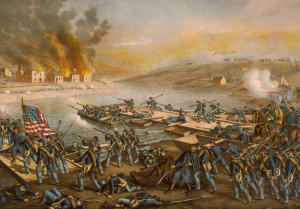 when, at the start of the Civil War, demand for his creation soared. By 1865, more than 55,000 carbines had been ordered, and the Burnside had become one of the most popular Union weapons of the war, second only to the Sharp carbine and my ancestor, Christopher Spencer’s Spencer carbine.
when, at the start of the Civil War, demand for his creation soared. By 1865, more than 55,000 carbines had been ordered, and the Burnside had become one of the most popular Union weapons of the war, second only to the Sharp carbine and my ancestor, Christopher Spencer’s Spencer carbine.
Burnside would eventually have a claim to fame, but it would not be for war or weapons. Burnside liked to wear his facial hair in what was an unusual way for the times. He had a bushy beard and moustache along with a clean-shaven chin. These distinctive whiskers were originally dubbed “burnsides,” but later the term would be altered and would become “sideburns.”
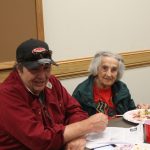
 With each passing year, I find myself looking forward more and more to the Byer Family Christmas Party. Sadly, I think that part of the reason is that as time passes, we seem to lose more and more of my aunts and uncles. This year found us with only four aunts and only one uncle at the party. There are other uncles who are still alive, but that aren’t really able to come out for these events any more. It makes each time we get together that much more precious. I always feel sorry for those who didn’t make it to the party, because we always have such a nice time, and we are a family of excellent cooks, so the food is fabulous. And it is a way to keep those who have gone to Heaven just a little closer to the family. Nevertheless, the sadness over missing those who have left us persists, and grows with each new passing.
With each passing year, I find myself looking forward more and more to the Byer Family Christmas Party. Sadly, I think that part of the reason is that as time passes, we seem to lose more and more of my aunts and uncles. This year found us with only four aunts and only one uncle at the party. There are other uncles who are still alive, but that aren’t really able to come out for these events any more. It makes each time we get together that much more precious. I always feel sorry for those who didn’t make it to the party, because we always have such a nice time, and we are a family of excellent cooks, so the food is fabulous. And it is a way to keep those who have gone to Heaven just a little closer to the family. Nevertheless, the sadness over missing those who have left us persists, and grows with each new passing.
I think one reason that our grandparents wanted their children to continue the annual Christmas party and annual picnic was so that we would all get to know each other better. As the new generations come along. It would be so easy to lose touch with each other. That would be so sad, because little kids are usually instant 

 friends, and that makes it extra special to watch. The kids had a sparkle in their eyes, and smiles on their faces. They were so excited to have new friends to play with and lots of room to run around, with no one to get upset at them. For kids, Christmas is always a special time of year, and it’s really hard to hold back the excitement. I love watching them bounce around the room. I could say that they ran around the room, but that wouldn’t be right exactly, because they really did bounce with excitement, and after all, it’s all about the kids right.
friends, and that makes it extra special to watch. The kids had a sparkle in their eyes, and smiles on their faces. They were so excited to have new friends to play with and lots of room to run around, with no one to get upset at them. For kids, Christmas is always a special time of year, and it’s really hard to hold back the excitement. I love watching them bounce around the room. I could say that they ran around the room, but that wouldn’t be right exactly, because they really did bounce with excitement, and after all, it’s all about the kids right.
My grandparents were wise people. They had a vision for their kids and grandkids…for all of the generations that would follow them. They knew how easy it is to get busy in life, and to lose touch with family. It happens 
 in so many families, and they didn’t want that for their family. Very wise people indeed. They wanted their kids not only to know their nieces and nephews, but also their grand nieces and nephews, and great grand nieces and nephews, for as long as they lived. What a precious gift that request turned out to be. It was not a burden to be carried or work to be done…it was a gift, and one I am thankful for every single year. It’s a time for family and reconnecting. While we miss all those who are gone now, I know that they would be proud of us for continuing this tradition. We love you all.
in so many families, and they didn’t want that for their family. Very wise people indeed. They wanted their kids not only to know their nieces and nephews, but also their grand nieces and nephews, and great grand nieces and nephews, for as long as they lived. What a precious gift that request turned out to be. It was not a burden to be carried or work to be done…it was a gift, and one I am thankful for every single year. It’s a time for family and reconnecting. While we miss all those who are gone now, I know that they would be proud of us for continuing this tradition. We love you all.
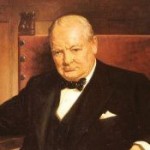 It’s always fun to find out that you are related to someone who is famous, and for me, it has been common knowledge for all of my life. The Spencer side of my family is full of aristocracy. Some are princes and princesses, and even future kings, and others were great strategists, like Winston Leonard Spencer-Churchill, who is my 15th cousin once removed. You will notice the hyphen, and while it isn’t in his name, it is nevertheless, correct. He was a product of grandparents who merged two wealthy family names, when his 4th great grandfather, Charles Spencer married Ann Churchill and they hyphenated the names. Later, family members either used the traditional Spencer name, such as Diana Spencer’s line, or they used the Churchill name, as Winston Churchill’s line did, even though they continued the Spencer part of the name in his line. People have often thought it was his middle name, but that is not so. I don’t know if they used the hyphen back then, but the names were both last names.
It’s always fun to find out that you are related to someone who is famous, and for me, it has been common knowledge for all of my life. The Spencer side of my family is full of aristocracy. Some are princes and princesses, and even future kings, and others were great strategists, like Winston Leonard Spencer-Churchill, who is my 15th cousin once removed. You will notice the hyphen, and while it isn’t in his name, it is nevertheless, correct. He was a product of grandparents who merged two wealthy family names, when his 4th great grandfather, Charles Spencer married Ann Churchill and they hyphenated the names. Later, family members either used the traditional Spencer name, such as Diana Spencer’s line, or they used the Churchill name, as Winston Churchill’s line did, even though they continued the Spencer part of the name in his line. People have often thought it was his middle name, but that is not so. I don’t know if they used the hyphen back then, but the names were both last names.
Churchill was born to Lord Randolph Spencer and his wife Jennie Jerome, on November 30, 1874. They were members of a prestigious family with a long history of military service and upon his father’s death in 1895, 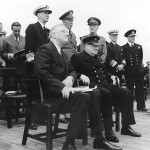 Winston joined the British Fourth Hussars. During the next five years, Winston Churchill enjoyed an illustrious military career, serving in India, the Sudan, and South Africa, and distinguishing himself several times in battle. In 1899, he resigned his commission to concentrate on his literary and political career and in 1900 was elected to Parliament as a Conservative MP from Oldham. In 1904, he began serving in a number of important posts before being appointed Britain’s First Lord of the Admiralty in 1911. Churchill foresaw a war that would bring with it a need for a navy that was ready, and well thought out strategies that would bring victory, and he worked to bring such a British Navy into existence. Churchill was a born strategist.
Winston joined the British Fourth Hussars. During the next five years, Winston Churchill enjoyed an illustrious military career, serving in India, the Sudan, and South Africa, and distinguishing himself several times in battle. In 1899, he resigned his commission to concentrate on his literary and political career and in 1900 was elected to Parliament as a Conservative MP from Oldham. In 1904, he began serving in a number of important posts before being appointed Britain’s First Lord of the Admiralty in 1911. Churchill foresaw a war that would bring with it a need for a navy that was ready, and well thought out strategies that would bring victory, and he worked to bring such a British Navy into existence. Churchill was a born strategist.
Winston Churchill’s military leadership took quite a blow during World War I, when he was held responsible for the disastrous Dardanelles and Gallipoli campaigns in 1915, and he was excluded from the war coalition government. He resigned his commission, and volunteered to command an infantry battalion in France. In 1917, Churchill returned to politics. He became a cabinet member of the Liberal government of Lloyd George, a move that I suspect he would regret. From 1919 to 1921, he was secretary of state for war. Then, in 1924 he returned to the Conservative Party, where two years later he played a leading role in the defeat of the General Strike of 1926. Out of office from 1929 to 1939, Churchill issued unheeded warnings of the threat of German 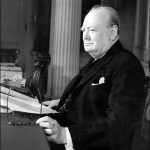 and Japanese attacks. After the outbreak of World War II in Europe, Churchill was called back to his post as First Lord of the Admiralty and eight months later replaced Neville Chamberlain, an ineffective military leader, as prime minister of a new coalition government. In the first year of his administration, Britain stood alone against Nazi Germany, but Churchill promised his country and the world that the British people would “never surrender.” He rallied the British people to a strong resistance and expertly orchestrated Franklin D Roosevelt and Joseph Stalin into an alliance that eventually crushed the Axis. Churchill proved himself to be the best military leader Britain could possibly have had at a time when he was desperately needed. Today would have been Winston Spencer Churchill’s 142nd birthday.
and Japanese attacks. After the outbreak of World War II in Europe, Churchill was called back to his post as First Lord of the Admiralty and eight months later replaced Neville Chamberlain, an ineffective military leader, as prime minister of a new coalition government. In the first year of his administration, Britain stood alone against Nazi Germany, but Churchill promised his country and the world that the British people would “never surrender.” He rallied the British people to a strong resistance and expertly orchestrated Franklin D Roosevelt and Joseph Stalin into an alliance that eventually crushed the Axis. Churchill proved himself to be the best military leader Britain could possibly have had at a time when he was desperately needed. Today would have been Winston Spencer Churchill’s 142nd birthday.
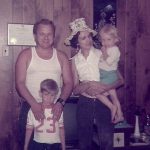 So many times, a loved one leaves us when we least expect it. We thought they were too young, or that they would always be there, or at the very least, we thought we would have a little more time. Then, in the blink of an eye, our loved one has left us and moved to Heaven, and we are left with the pain of loss, and continuing grief. Such was the case with my cousin, Bernard “Shorty” Cameron, who slipped away in the wee hours of Sunday morning, November 27, 2016. Shorty had been a part of our family for almost 47 years, having married my cousin, Shirley Wolfe on December 28, 1969 in Reno, Nevada. Their marriage would bless them with two beautiful children, Larry and Tonnya, and four grandchildren, Nehemiah, Tyrel, Moira, and Conner.
So many times, a loved one leaves us when we least expect it. We thought they were too young, or that they would always be there, or at the very least, we thought we would have a little more time. Then, in the blink of an eye, our loved one has left us and moved to Heaven, and we are left with the pain of loss, and continuing grief. Such was the case with my cousin, Bernard “Shorty” Cameron, who slipped away in the wee hours of Sunday morning, November 27, 2016. Shorty had been a part of our family for almost 47 years, having married my cousin, Shirley Wolfe on December 28, 1969 in Reno, Nevada. Their marriage would bless them with two beautiful children, Larry and Tonnya, and four grandchildren, Nehemiah, Tyrel, Moira, and Conner.
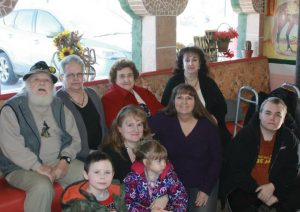
Shorty, and my cousin, Shirley have spent most of their married lives living high up in the woods of Wolfe mountain, named after her parents, Ruth and Jim, who settled there and gave the mountain it’s name. They built three houses on the mountain top, near each other, but with plenty of room to spread out and make their places their own. Shirley and Shorty raised a variety of animals and their two children there. I suppose some people would say that it was a lot like the Wilderness Family movies, but they liked the life they led. Being in the great outdoors, far away from the hustle and bustle of the city. Surrounded by tall trees and the wildlife that roamed the area.
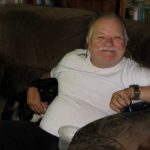
My mom, Colleen Spencer, my sister, Cheryl Masterson, and I had the chance to go and visit our family in Washington in 2013, and while it was a sad event, because it was for my Uncle Jim’s funeral, I still treasured the trip, because it gave us a chance to see our precious family again. I am especially glad now that we were able to see Shorty, because as it turns out, it was for the last time. That thought makes me quite sad. It was also the last time they got to see my mom, who left us in 2015. You just never know about these things, so it is always important to take the opportunity when it presents itself. I’m glad we got to spend that time with Shorty. We love you Shorty, and we will miss you very much.
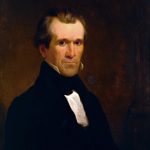 I was looking at a fact site last night, and found a list of unusual facts about the presidents of the United States. While the facts about each president were everything from strange, to bizarre, to amazing, I found myself drawn to what I read about James K Polk, who happens to be the 2nd cousin 1x removed of the husband of my 5th cousin 2x removed. That sounds very confusing to people, and I can say that it is confusing to me too. Nevertheless, my family and my husband, Bob’s family trees are intertwined, and that is a fact I have known for a while now. James Polk is just another in the line of people we are both connected to. Those are the facts I knew about James K Polk…as well as, the fact that his middle name is Knox and that is how he is related to Bob’s side of our family. My own connection comes from the Allen side of my dad’s family…and that I did not know before.
I was looking at a fact site last night, and found a list of unusual facts about the presidents of the United States. While the facts about each president were everything from strange, to bizarre, to amazing, I found myself drawn to what I read about James K Polk, who happens to be the 2nd cousin 1x removed of the husband of my 5th cousin 2x removed. That sounds very confusing to people, and I can say that it is confusing to me too. Nevertheless, my family and my husband, Bob’s family trees are intertwined, and that is a fact I have known for a while now. James Polk is just another in the line of people we are both connected to. Those are the facts I knew about James K Polk…as well as, the fact that his middle name is Knox and that is how he is related to Bob’s side of our family. My own connection comes from the Allen side of my dad’s family…and that I did not know before.
James K Polk was the first president to be elected under the age of 50, and the youngest to die, with the exception of Garfield and Kennedy, both of whom were assassinated. Polk had surgery at the age of 17, to remove stones from his bladder. This was before anesthesia was invented, so he was awake for the entire 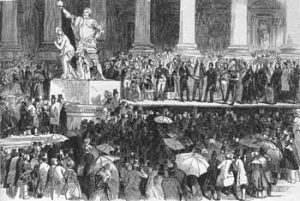 procedure. I can’t imagine how painful that must have been. Polk is the only Speaker of the US House of Representatives to become President of the United States. His years as president were active ones. They saw three states added to the nation, the first Women’s Rights Convention was held, the sewing machine, gas lighting, and the rotary printing press were invented, and the Gold Rush began. Polk was a highly motivated president, and it is believed that he worked so hard while serving as president that he weakened himself, causing his death shortly after leaving office.
procedure. I can’t imagine how painful that must have been. Polk is the only Speaker of the US House of Representatives to become President of the United States. His years as president were active ones. They saw three states added to the nation, the first Women’s Rights Convention was held, the sewing machine, gas lighting, and the rotary printing press were invented, and the Gold Rush began. Polk was a highly motivated president, and it is believed that he worked so hard while serving as president that he weakened himself, causing his death shortly after leaving office.
Polk had just two years of formal schooling prior to entering the University of North Carolina as a sophomore. He was a member of a debating society in college, and he found that he had an interest in law and government. Polk graduated with top honors in mathematics and the classics. Then he returned home to Tennessee to become a lawyer. To receive legal training, he worked in the office of Nashville trial attorney, Felix Grundy and then served as clerk of the Tennessee Senate. Polk was diligent and ambitious, and soon 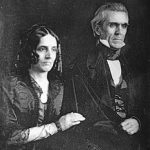 established a law practice in Columbia, Tennessee. At 27 years of age, Polk’s interests turned to politics, and he defeated an incumbent for a seat in the Tennessee Legislature. During his time as state representative, he met and eventually married Sarah Childress, who was the very intelligent daughter of a Murfreesboro merchant. She was well educated and her social grace impressed their peers. She became her husband’s personal and political confidant, it was her involvement in his campaigns that helped to ensure his victories. Fervently supporting the policies of fellow Tennessee Democrat Andrew Jackson, Polk was elected to the United States Congress at 29. His Congressional career lasted 14 years and included two terms as Speaker of the House. He must have been well liked to then go on the become President of the United States as well.
established a law practice in Columbia, Tennessee. At 27 years of age, Polk’s interests turned to politics, and he defeated an incumbent for a seat in the Tennessee Legislature. During his time as state representative, he met and eventually married Sarah Childress, who was the very intelligent daughter of a Murfreesboro merchant. She was well educated and her social grace impressed their peers. She became her husband’s personal and political confidant, it was her involvement in his campaigns that helped to ensure his victories. Fervently supporting the policies of fellow Tennessee Democrat Andrew Jackson, Polk was elected to the United States Congress at 29. His Congressional career lasted 14 years and included two terms as Speaker of the House. He must have been well liked to then go on the become President of the United States as well.
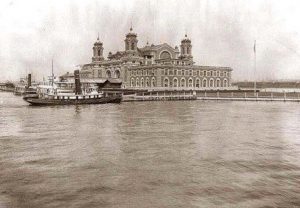 A number of my ancestors came to America during and prior to the years that Ellis Island was the processing center in New York. I have no doubt that some of them came through Ellis Island, but I have not confirmed that. I find many of the names in my tree, but while many of the ancestors I have found came over by way of New York, it would appear that my direct line arrived in America before the immigration center at Ellis Island opened on January 2, 1892. Before that time, immigrants were handled by the individual states where the immigrant first arrived. It is estimated that about 40% of Americans can trace their roots through Ellis Island, so while I see many familiar names, they may or may not be my direct line, and in fact, they might not be related at all.
A number of my ancestors came to America during and prior to the years that Ellis Island was the processing center in New York. I have no doubt that some of them came through Ellis Island, but I have not confirmed that. I find many of the names in my tree, but while many of the ancestors I have found came over by way of New York, it would appear that my direct line arrived in America before the immigration center at Ellis Island opened on January 2, 1892. Before that time, immigrants were handled by the individual states where the immigrant first arrived. It is estimated that about 40% of Americans can trace their roots through Ellis Island, so while I see many familiar names, they may or may not be my direct line, and in fact, they might not be related at all.
Ellis Island is located in New York Harbor off the New Jersey coast and was named for merchant Samuel Ellis, who owned the land in the 1770s. The island was given the nickname, The Gateway to America because more than 12 million immigrants passed through the center since it opened in 1892. On January 2, 1892, 15 year old Annie Moore, from Ireland, became the first person to pass through the newly opened Ellis Island, which President Benjamin Harrison designated as America’s first federal immigration center in 1890. Oddly, not all 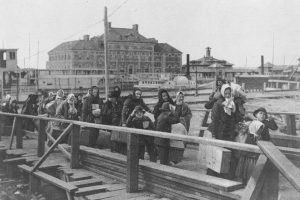 immigrants who sailed into New York had to go through Ellis Island. First and second class passengers were just given a brief shipboard inspection and then disembarked at the piers in New York or New Jersey, where they passed through customs. People in third class, though, were transported to Ellis Island, where they underwent medical and legal inspections to ensure they didn’t have a contagious disease or some condition that would make them a burden to the government. Nevertheless, only two percent of all immigrants were denied entrance into the United States. The peak years of immigration through Ellis Island were from 1892 to 1924. The 3.3 acre island was enlarged by landfill, and by the 1930s, it had reached its current size of 27.5 acres. After the extra size was completed, new buildings were constructed to handle the massive influx of people coming to America for a better life. During it’s busiest year, which was 1907, over 1 million people were processed through Ellis Island.
immigrants who sailed into New York had to go through Ellis Island. First and second class passengers were just given a brief shipboard inspection and then disembarked at the piers in New York or New Jersey, where they passed through customs. People in third class, though, were transported to Ellis Island, where they underwent medical and legal inspections to ensure they didn’t have a contagious disease or some condition that would make them a burden to the government. Nevertheless, only two percent of all immigrants were denied entrance into the United States. The peak years of immigration through Ellis Island were from 1892 to 1924. The 3.3 acre island was enlarged by landfill, and by the 1930s, it had reached its current size of 27.5 acres. After the extra size was completed, new buildings were constructed to handle the massive influx of people coming to America for a better life. During it’s busiest year, which was 1907, over 1 million people were processed through Ellis Island.
When the United States entered into World War I, immigration to the United States decline, most likely because travel anywhere was risky. Ellis Island was used as a detention center for suspected enemies during that time. Following the war, Congress passed quota laws and the Immigration Act of 1924, which sharply reduced the number of newcomers allowed into the country and also enabled immigrants to be processed at United States 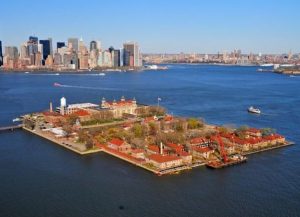 consulates abroad. The act also enabled immigrants to be processed at United States consulates abroad, making detention at Ellis Island obsolete. After 1924, Ellis Island switched from a processing center to other purposes, such as a detention and deportation center for illegal immigrants, a hospital for wounded soldiers during World War II and a Coast Guard training center. In November 1954, the last detainee, a Norwegian merchant seaman, was released and Ellis Island officially closed on November 12, 1954. In 1984, Ellis Island underwent a $160 million renovation, the largest historic restoration project in United States history. In September 1990, the Ellis Island Immigration Museum opened to the public and is visited by almost 2 million people each year.
consulates abroad. The act also enabled immigrants to be processed at United States consulates abroad, making detention at Ellis Island obsolete. After 1924, Ellis Island switched from a processing center to other purposes, such as a detention and deportation center for illegal immigrants, a hospital for wounded soldiers during World War II and a Coast Guard training center. In November 1954, the last detainee, a Norwegian merchant seaman, was released and Ellis Island officially closed on November 12, 1954. In 1984, Ellis Island underwent a $160 million renovation, the largest historic restoration project in United States history. In September 1990, the Ellis Island Immigration Museum opened to the public and is visited by almost 2 million people each year.
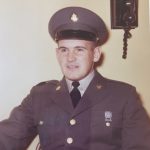
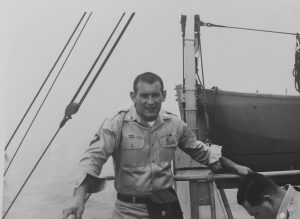 When most people think of Hawaii, they think of a tropical paradise, but for my husband, Bob’s uncle, Butch Schulenberg nothing could be further from the truth…at least not during his days in the service. When we think of Hawaii, snow does not come to mind, but in reality, “It snows here every year, but only at the very summits of our 3 tallest volcanoes (Mauna Loa, Mauna Kea and Haleakala),” says Ken Rubin, geology and geophysics professor at the University of Hawaii. “The snow level almost never gets below 9,000 feet in Hawaii during the winter, but since these mountains are taller than 13,000 feet, 13,000 feet, and 10,000 feet, respectively, they get dusted with snow a few times a year. It rarely stays on the ground for more than a few days though.”
When most people think of Hawaii, they think of a tropical paradise, but for my husband, Bob’s uncle, Butch Schulenberg nothing could be further from the truth…at least not during his days in the service. When we think of Hawaii, snow does not come to mind, but in reality, “It snows here every year, but only at the very summits of our 3 tallest volcanoes (Mauna Loa, Mauna Kea and Haleakala),” says Ken Rubin, geology and geophysics professor at the University of Hawaii. “The snow level almost never gets below 9,000 feet in Hawaii during the winter, but since these mountains are taller than 13,000 feet, 13,000 feet, and 10,000 feet, respectively, they get dusted with snow a few times a year. It rarely stays on the ground for more than a few days though.”
I had no idea, as I’m sure many of you could also say. I don’t know if Butch knew what he was getting into when he and the officer he was driving for, went to one of those areas where there was not only snow, but it was cold…really cold. In fact, the only way that Butch could even begin to stay warm was to bundle up in his sleeping bag. He probably would have tied it all the way over his head, if he could breathe that way. It was a complete shock to his system, as it would have been to mine. Being stationed in Hawaii would be the dream assignment, and here Butch was…in the snow. In fact, I can just hear him telling his parents, “It’s freezing here!!” The thought is almost laughable, or would have been if it weren’t so cold.
Butch told my husband, Bob and me several stories about his driving days in the service, when we were there for a visit about a month ago. It was interesting to listen to the details that a driver would have known about 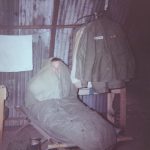
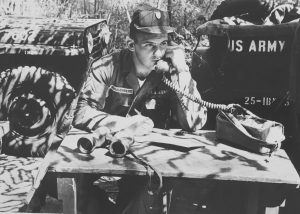 the situations that the company would have been in…and probably a lot of responsibility too. Much of the details of the movements of the company and the battles they engaged in, were classified, and to say anything at the time could have put people in danger or get them killed. A good driver would have known when to talk and when to keep quiet. Butch was a good driver, and well respected. I am proud of his service. Thank you Butch. Today is Butch’s birthday. Happy birthday Butch!! Have a great day!! We love you!!
the situations that the company would have been in…and probably a lot of responsibility too. Much of the details of the movements of the company and the battles they engaged in, were classified, and to say anything at the time could have put people in danger or get them killed. A good driver would have known when to talk and when to keep quiet. Butch was a good driver, and well respected. I am proud of his service. Thank you Butch. Today is Butch’s birthday. Happy birthday Butch!! Have a great day!! We love you!!
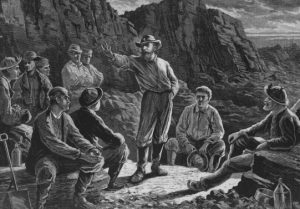 During the Great Potato Famine of September 1845 in Ireland, the leaves on potato plants suddenly turned black and curled, then rotted, seemingly the result of a fog that had rolled across the fields of Ireland. In reality, the cause was an airborne fungus named Phytophthora Infestans. It was originally transported in the holds of ships traveling from North America to England. The resulting loss of the potato crops, put the people of Ireland in dire straits. Many people decided that it was time to immigrate to America. In fact, more than a million people immigrated to America and most settled in the coal regions of Pennsylvania. Many of the Irish Catholics immigrants were routinely met with discrimination based on both their religion and heritage. They often encountered help wanted signs with disclaimers that read, “Irish need not apply.” These days, that practice would have met with harsh retaliation due to anti-discrimination laws.
During the Great Potato Famine of September 1845 in Ireland, the leaves on potato plants suddenly turned black and curled, then rotted, seemingly the result of a fog that had rolled across the fields of Ireland. In reality, the cause was an airborne fungus named Phytophthora Infestans. It was originally transported in the holds of ships traveling from North America to England. The resulting loss of the potato crops, put the people of Ireland in dire straits. Many people decided that it was time to immigrate to America. In fact, more than a million people immigrated to America and most settled in the coal regions of Pennsylvania. Many of the Irish Catholics immigrants were routinely met with discrimination based on both their religion and heritage. They often encountered help wanted signs with disclaimers that read, “Irish need not apply.” These days, that practice would have met with harsh retaliation due to anti-discrimination laws.
I know that a number of my ancestors came from Ireland, and I would not be surprised to find that a number of my ancestors were among those immigrants that came to America to find a better life. The unfortunate thing was that the few people who would hire them, and the few places that would rent to them, were corrupt people. The immigrants finally accepted the most physically demanding and dangerous mining jobs, just to have work. The men and their families were forced to live in overcrowded housing, buy from shops, and visit doctors all “owned” by the company. In many cases, workers wound up owing their employers at the end of 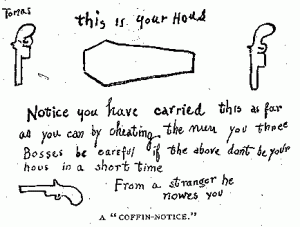 each month. The Irish immigrants were in a very tough situation, but they had been there before, and they were not going to continue to be victimized.
each month. The Irish immigrants were in a very tough situation, but they had been there before, and they were not going to continue to be victimized.
The abuse triggered a period of violence in Schuylkill County, Pennsylvania, between 1861 and 1875. The violence which included assaults, arsons, and murders were blamed on a secret society of Irish immigrants known as the Molly Maguires. The group originally emerged in northern Ireland in the 1840s, as a branch of the long line of rural secret societies including the Whiteboys and Ribbonmen, who responded to miserable working conditions and evictions by tenant landlords with bloody vengeance. When the Civil War broke out, the Irish immigrants were drafted to serve, and they rebelled by sending out “coffin notices” threatening death, because they perceived the war to be a “rich man’s war,” and they wanted no part of it. The notes were alleged to have been written by the Molly Maguires, because they didn’t want to lose their jobs to scabs. Threats were actually carried out 24 times when foremen and supervisors were assassinated.
In 1873, the president of the Reading Railroad, Franklin Gowen hired the Pinkerton Detective Agency to infiltrate and destroy the Molly Maguires, because their union activities were impeding that railroad’s ability to increase profits. The detective, James McParlan, used the alias, James McKenna to infiltrate the group. Oddly, he was an Irishman himself, but I guess money was more important to him. Franklin Gowen served as the chief 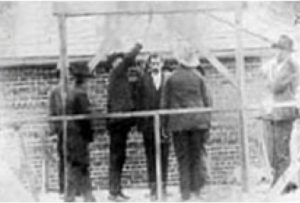 prosecutor, even though his railroad holdings made his participation a conflict of interest. Based almost entirely on McParlan’s testimony, 20 men were sentenced to death—10 of whom were executed on June 21, 1877, also known as Black Thursday. The men declared their innocence right up to the end. Although the existence of the Molly Maguires as an organized band of outlaws in America is under debate to this day, most historians now agree that the trials and executions were an outrageous perversion of the criminal justice system. In 1979, more than 100 years following his hanging, John Kehoe, who was the supposed “king” of the Molly Maguires, was granted a full pardon by the state of Pennsylvania.
prosecutor, even though his railroad holdings made his participation a conflict of interest. Based almost entirely on McParlan’s testimony, 20 men were sentenced to death—10 of whom were executed on June 21, 1877, also known as Black Thursday. The men declared their innocence right up to the end. Although the existence of the Molly Maguires as an organized band of outlaws in America is under debate to this day, most historians now agree that the trials and executions were an outrageous perversion of the criminal justice system. In 1979, more than 100 years following his hanging, John Kehoe, who was the supposed “king” of the Molly Maguires, was granted a full pardon by the state of Pennsylvania.
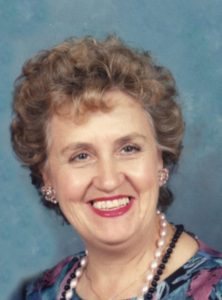
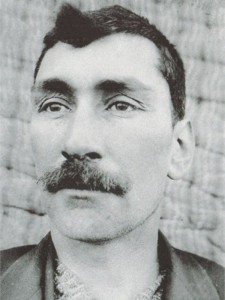 As I contemplated today’s story, I thought about one of my biggest fans…my mom, Collene Spencer, but I’m getting a little ahead of myself. I was researching a part of our family tree, after a conversation with a co-worker, Carrie Beauchamp, who had the opportunity, while living back east to visit one of the Vanderbilt mansions. I knew that my 2nd great uncle was named Cornealius Vanderbilt Spencer, but I didn’t know if there was any real connection, or rather maybe his mother just wished there had been a connection. So, I set out to look. I was pretty sure I had seen the Vanderbilt name somewhere else in my tree. My research brought me to Consuelo Vanderbilt, who married Charles Richard Spencer Churchill, who is my 15th cousin once removed.
As I contemplated today’s story, I thought about one of my biggest fans…my mom, Collene Spencer, but I’m getting a little ahead of myself. I was researching a part of our family tree, after a conversation with a co-worker, Carrie Beauchamp, who had the opportunity, while living back east to visit one of the Vanderbilt mansions. I knew that my 2nd great uncle was named Cornealius Vanderbilt Spencer, but I didn’t know if there was any real connection, or rather maybe his mother just wished there had been a connection. So, I set out to look. I was pretty sure I had seen the Vanderbilt name somewhere else in my tree. My research brought me to Consuelo Vanderbilt, who married Charles Richard Spencer Churchill, who is my 15th cousin once removed.
I knew that I was related to Winston Spencer Churchill, who is also my 15th cousin once removed, and I knew how his name had been changed from what should have been Spencer, when his 4th great grandfather, Charles Spencer married one Anne Churchill, in a merger that was mutually beneficial to both families, and changed the name to Spencer-Churchill. Through the years some of that branch of the family went on to stay 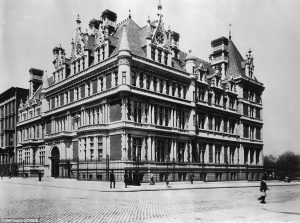 Spencer-Churchill, eventually dropping the hyphen, making the Spencer name appear to be a middle name. Others dropped the Churchill name, going back to Spencer, and still others dropped the Spencer name, deciding to stick with Churchill. Nevertheless, they are all my cousins at some level. In my search, I found where Consuelo Vanderbilt was indeed my 15th cousin once removed, and so my 2nd great grandparents, Allen and Lydia Spencer did have the actual connection to the Vanderbilt name, and were justified in naming their son Cornealius Vanderbilt Spencer. And since there was an actual Cornealius Vanderbilt, who built the Vanderbilt mansion in New York City, I guess the first name was after an ancestor too.
Spencer-Churchill, eventually dropping the hyphen, making the Spencer name appear to be a middle name. Others dropped the Churchill name, going back to Spencer, and still others dropped the Spencer name, deciding to stick with Churchill. Nevertheless, they are all my cousins at some level. In my search, I found where Consuelo Vanderbilt was indeed my 15th cousin once removed, and so my 2nd great grandparents, Allen and Lydia Spencer did have the actual connection to the Vanderbilt name, and were justified in naming their son Cornealius Vanderbilt Spencer. And since there was an actual Cornealius Vanderbilt, who built the Vanderbilt mansion in New York City, I guess the first name was after an ancestor too.
As I thought about that connection, my mind instinctively thought of how much my biggest fan…my mom would have loved that story. Of course, when those thoughts of my parents, and my desire to tell them something surface, my mind, in its ability to fool itself, thinks that I really can’t wait to tell my parents what I have found, or to have my mom read this story. She would have been so excited to hear that new information. It wasn’t that she ever wanted to be snobby, or even that she would have cared about being related to the Vanderbilt 
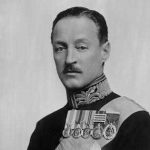 family, but rather that she would have found the information very interesting, and in fact, as amazing as I did, because it really is a small world, when you think about it. I’m sure there are many other famous, rich, or even infamous people that our family is related to, because there are so many branches that split off of the originals, that it’s bound to connect us to someone famous at some point. I just always find it rather surprising every time it happens, and I think my mom did too. I wish I could have told her about it…but then I suppose she already knows.
family, but rather that she would have found the information very interesting, and in fact, as amazing as I did, because it really is a small world, when you think about it. I’m sure there are many other famous, rich, or even infamous people that our family is related to, because there are so many branches that split off of the originals, that it’s bound to connect us to someone famous at some point. I just always find it rather surprising every time it happens, and I think my mom did too. I wish I could have told her about it…but then I suppose she already knows.

